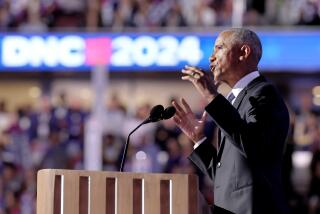Democrats Call for Strong Case on Iraq
- Share via
WASHINGTON — WASHINGTON -- On the eve of the State of the Union address, congressional Democratic leaders on Monday challenged President Bush to make a more compelling case for a possible war against Iraq.
But a White House spokesman said the speech would focus more on domestic matters, saying Bush would fully lay out the case for military action against Iraq if, in the president’s view, an armed conflict with Saddam Hussein’s regime becomes unavoidable.
In unusually pointed remarks in advance of Bush’s speech tonight, Senate Minority Leader Tom Daschle (D-S.D.) and House Minority Leader Nancy Pelosi (D-San Francisco) accused Bush of failing to address growing doubts at home and abroad about a U.S. attack on Iraq.
“Of all the decisions facing this president, none has more profound consequences than launching a war against Iraq, and none is in greater need of a clear, complete and definitive explanation,” Daschle said in an appearance with Pelosi at the National Press Club.
Pelosi said: “I would not wish to question the motivation of the president of the United States when he is deciding to put our young men and women in harm’s way. I do think, though, that an explanation is needed to the American people as to why we are going there.”
The speeches were indicative of a more aggressive posture among Democratic leaders toward Bush after the party’s losses in November’s elections. Recent polls have shown support for the president slipping on a number of issues, including the economy, and growing skepticism about invading Iraq without broad allied support.
“The Democrats sense a crack in the president’s support, and they’re going to focus all their attention on trying to widen it,” said Don Kettl, a University of Wisconsin political scientist. “They’re focusing on important issues like Iraq where, they believe, the president is pushing harder, farther and faster than the people want.”
At the White House, Press Secretary Ari Fleischer acknowledged that Bush has not completely detailed his case for war. But Fleischer said, “In the event the president does make the determination that it will be necessary to go to war, he will, of course, make more of a case.”
Republican supporters of Bush’s Iraq policy agreed that he has yet to spell out the need for war in terms explicit and compelling enough for much of the public. Many said, however, that Bush does not need to do so in the State of the Union.
“In time, many people [on Capitol Hill] expect the president to make that case,” said Sam Stratman, spokesman for House International Relations Committee Chairman Henry J. Hyde (R-Ill.). “He doesn’t necessarily have to do it [in today’s speech].”
Still, some hoped Bush would lay the groundwork for a fuller discussion of Iraq and other foreign policy concerns in the near future.
“The key challenge is to return the American people’s focus to the war on terrorism and the imperative to dispose of Saddam,” said a senior Senate Republican aide. “Over the last few months both the administration and the American people have lost that focus.... The type of consensus Bush enjoyed in the months after 9/11 has significantly dissipated.”
According to “talking points” distributed to congressional Republicans, Bush tonight will outline proposals to stimulate the economy and create jobs, improve health care, “encourage acts of compassion” and strengthen security at home and abroad. He also will urge Congress to pass limits on medical malpractice lawsuits to help curtail rising health-care costs and propose a “major research effort to add to our future security.”
Daschle, although critical of Hussein’s regime, said Bush needs to show that the Iraqi leader “poses a threat to our national security so imminent that it justifies putting American lives at risk to get rid of him.”
“If we have proof of nuclear and biological weapons, why don’t we show that proof to the world, as President Kennedy did 40 years ago when he sent Adlai [E.] Stevenson to the United Nations to show the world U.S. photographs of offensive missiles in Cuba?” Daschle said.
Daschle was among 29 Senate Democrats who supported a Bush-backed resolution in October authorizing the use of military force against Iraq. But Monday, he said that the White House has given so many reasons for military action against Iraq, “it makes people wonder which one is the real one, or if the real reason is none of the above. It makes people doubt there is a guiding principle.”
Pelosi was among 126 House Democrats opposing the resolution authorizing force against Iraq. In her remarks Monday, she said, “At the end of the day, it may be that the American people conclude that we have no choice but to put our young people in harm’s way. But I think we have to take every precaution before we do that.”
Daschle and Pelosi also assailed Bush’s record on education, the environment, homeland security and the economy.
Pelosi called Bush’s $674-billion economic stimulus plan the “Joe Millionaire tax plan.”
“It romances middle-class Americans with the promise of big bucks, but in the end the surprise is they get pennies,” she said.
Daschle termed the centerpiece of the president’s plan, eliminating the tax on corporate dividends, “dead on arrival.”
*
Times staff writer Edwin Chen contributed to this report.
More to Read
Get the L.A. Times Politics newsletter
Deeply reported insights into legislation, politics and policy from Sacramento, Washington and beyond. In your inbox three times per week.
You may occasionally receive promotional content from the Los Angeles Times.












